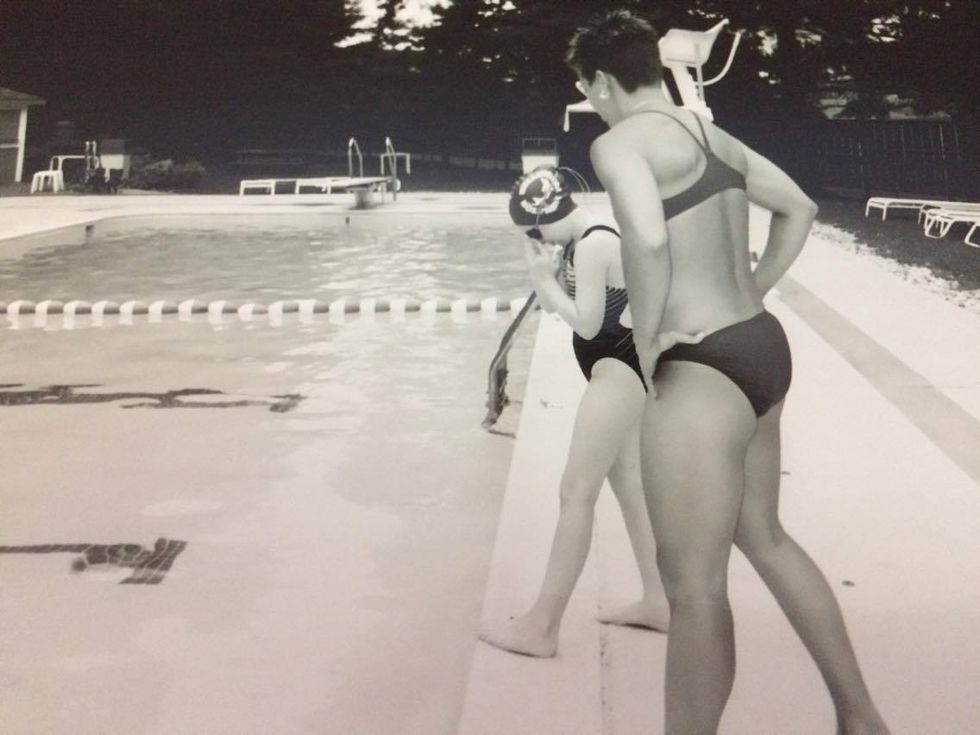Sports have always been an integral part of my life. Growing up I participated in a lot of varying activities but my favorite and best sport, even to this day, has been swimming. As a part of the swimming community I have been the swimmer, the coach, and the bystander. As such, I’ve experienced first hand the different perspectives held towards us coaches.
As an individual who has played each role (swimmer, coach, and bystander) I see coaches as role models who work so hard to teach children of all ages and abilities that the sky is literally the limit to what they can do. Coaches work so hard to build relationships with individuals of every role. We strive to have strong bonds with the children we teach and inspire on the daily; to have an understanding and connection with the parents who are entrusting us with their children; to be friends with the bystanders who not only help meets run smoothly but also become your little swimmers best cheerleaders (even the swimmers who are not their own children). Sometimes building this report with all these people is not the easiest thing in the world and patience is necessary to explain and help all roles through trying situations.
Now to the different perspectives swimmers, parents, and bystanders have towards coaches…
Swimmers typically view their coaches as role models no matter how much older their coach is than them. The youngest swimmers have a tendency to view their coach as who they want to be when they grow up. They think their coach is cool and successful and has the most fun job in the world being able to spend every second at the pool. The older swimmers see their coach as a friend and mentor. We embrace all these titles with pride. More likely than not, if the child loves their coach, they’ll love the sport; and if they love the sport they will excel it at.
Parents typically hold one of two views of their child’s coach. The first view is that their child’s coach is working tirelessly to help their child be the best little athlete they can be in every sense of the word. The coach is working to make sure their child has mastered their aquatic safety skills, is learning how to swim each stroke legally in competition, and is gaining in speed and endurance all while having fun. The second view is that their child’s coach is a glorified babysitter. Let me tell you, coaching for a parent who views you as such is so damaging to the child, coach, and other swimmers. Its damaging to the child because they wind up not wanting to be there; they don’t see the sport as something to be conquered that will instill in them hard work, determination, and confidence but rather as a free for all playtime session. It’s damaging to the coach because we lose confidence in our abilities to help your children be not only amazing swimmers, but also amazing individuals. It’s damaging to the other children in the class or team because they are losing the attention and devotion of their coach. This happens because the coach is working so hard to make sure that the child who does not want to be there still walks away with some gain at the end of lesson weather that be that they had fun, they learned how to tread water, or they beat their fastest freestyle time. To all the parents reading this, please do not view your child’s coach as a glorified babysitter; be engaged and committed to your child’s development as a swimmer.
Bystanders have a range of viewpoints when it comes to coaches. There’s the “how do they do it” viewpoint; the supportive perspective, and finally the viewpoint that they can teach children how to swim better than the coach can. Coaching is very demanding; both physically and mentally and sometimes we feel like we look like a chicken running around with its head cut off. Its really no wonder some people can’t fathom how we manage it all; keeping the children moving, teaching them new drills, getting meet entries organized, and so much more. Many bystanders are truly amazing and support the coach and team in every way; they are the timers, card runners, the lifeguards, those individuals running clerk of course and concessions, and all those cheerleaders in the stands. You all understand the hectic nature that is coaching; you see us walking around the pool deck in super speed mode (no running on deck, no matter how badly we want to sometimes) to make sure our swimmers are on track. Lastly, there are some bystanders who are just major critics. These are the individuals who honestly believe that they can coach better than the actual coach. This is one of the most frustrating things for coaches. We understand that many bystanders are retired swimmers and that their coaches did not coach the way we do, but that does not mean that our way of coaching is wrong; its just different. Many coaches actually go through training programs that teach the best methods on how to connect and teach swimming to children of varying ages. Just because we don’t do things the way you were taught, does not give you the right to knock it. Give us a chance; more likely than not, you’ll wind up being pleasantly surprised with our coaching abilities.
No matter what capacity you play in the sport of swimming (or any sport for that matter) I hope the one thing you take away from this is that coaches work so hard for their athletes; we want them to succeed at their sport and learn some life lessons along the way. If for some reason things are not going as planned with a coach, talk to them; I’m sure they’d be more than happy to find a way to improve the situation.
















